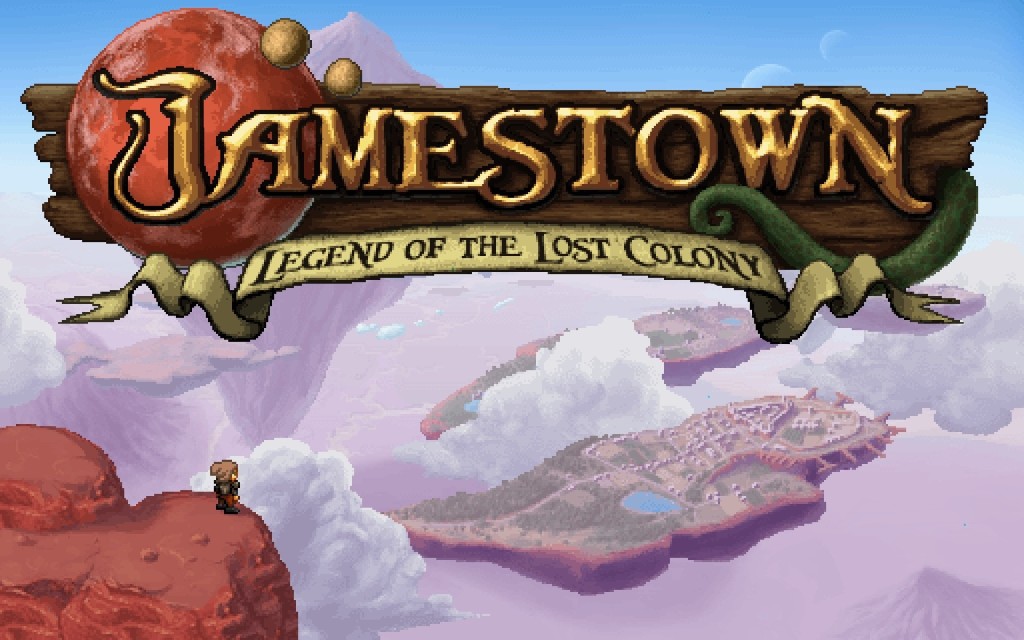Last updated on May 2, 2013
Um yeah, so more things! Jamestown and Sherlock seem like a good combination (also, I am not here if you’re reading this).
Jamestown – So, a bullet hell shooter by a Western developer. I’m not sure what to think of this situation; it’s just odd, and frankly weird, to play a game in this particular subgenre made by a bunch of guys from Pennsylvania, but I’ll roll with it.
Honestly, as a purveyor and rather bad player of CAVE shmups, Jamestown does not impress me even on that level. In an attempt to cater to a home audience, Jamestown seperates its levels into a map screen and lets you play in a variety of difficulty levels for each stage. Completing the progressively harder stages in the game leads to progress further, so you can’t do the whole game in one go like, say, a Japanese game of this type. I imagine these existed for the benefit of the person who couldn’t imagine a game that doesn’t save their progress or give them currency used to buy things. Rarely, if ever, do you see an option where playing the whole game through requires you to buy something. It’s odd and weird to me at best.
I understand the intention: they don’t want to intimidate the player too much in the beginning like, say, DoDonPachi: DaiOuJou certainly does to anyone who picks up a controller/arcade joystick. But would you rather a trial by fire as the game forces you to learn and adapt to its systems, or a slow slog through many levels repeatedly to learn the timing? I’ve already done the former, so Jamestown’s low difficulty levels bored me quite a bit. Not that I didn’t die (didn’t use a credit, though, and that’s all that counts), but it simply wasn’t interesting to see a screen scroll slowly, bullets scroll slowly, boss attacks slowly, etc. The “choose your level” setup removes all sense of tension from the game – apparently, the developers never heard of the one-credit rule. What happens, then, is that the game teaches you bad habits and then tries to crush you, which I honestly see as a little underhanded.
Additionally, the difficulty levels do something else that make the game rather anemic overall. Imagine you’re designing a game in this genre, and you want it to remain interesting and challenging throughout. Also, imagine that the bullet patterns need to look awesome and also challenge the player’s way of thinking – how do I get out of this? What strategy do I use for this seemingly insurmountable boss? Yes, the game might be trying to kill me (or take my credits, alternately), but it’s forcing me to abuse its systems and win. Hence, this is why most arcade shmups (and even doujin, if we’re getting picking) give one set of levels and little more. They’ve tuned and re-tuned these levels into a razor-sharp, deadly sheen. It’ll cut you if you aren’t paying attention! So Jamestown’s multiple difficulties show the lack of focus on a single one, to it’s detriment, They’re VERY similar, with only ramped-up speed being the big one I see offhand. That’s just not interesting or fun.
These are just preliminary impressions, though. As I get deeper into the game, I’ll probably post a fuller review.
Sherlock – English television shows and I usually don’t get along. I never quite understand their sense of comedy, or timing, or what they call “drama”. Much in the same way that most gamers don’t really understand Japanese games (and expect them to compare to some exacting cultural standard), I don’t get British stuff that often. When something comes along and I like it, I’d call it a cause for celebration.
Well, it’s a bit of cheating to say that the BBC Sherlock series is good. That’s like saying that something based on Sir Arthur Conan Doyle’s famous series of books COULD be bad (and you’d be utterly wrong, even when it comes to Robert Downey Jr.). But the creators Steven Moffat and Mark Gatiss translate the stories into the modern age in ways that represent the original cases AND remain new and interesting in their own right. It must be all the Doctor Who coming out of those guys or something. I don’t even like Doctor Who, but I can get behind the Science of Deduction.
If you didn’t like it before, you won’t like it now: murders with mysterious circumstances surrounding them, and Sherlock uses his Asperberger’s-like abilities to deduce from said surrounding to solve cases and possibly put himself in danger. Dr. Watston’s a military doctor who’s coming home from Afghanistan (this time around) who suffers from trauma. They end up working together because they need “flatmates” (whoever came up with the term ‘flat”…I don’t know what to say) to afford 221-B Baker Street. So they go on adventures, and we all love it. It’s a simple premise, meaning that the actors must make the action realistic, lively, and stay up to the task. Otherwise, you’ve got a boring police procedural that’ll put you to sleep when it comes up on TNT at some time in the near future.
Martin Freeman, who you’ll know from either the BBC Office or the new Hobbit trilogy, does a good job as the straightman for this round, yet he’s great in his own right. Benedict Cumberbatch, like any good Dr. Holmes, steals the show and makes it incredibly entertaining to watch. His delivery and hilarious witticism and criticism (all very insulting, of course, to normal people without archenemies) pushes my buttons and makes every hour-and-a-half episodes engaging and wonderful. I would also note the cinematography’s rather excellent for a television show – these are more like self-contained films with an overarching plot, so the clear visuals remain much appreciated (as well as many graphical effects that try to replicate Sherlock’s mind when solving cases).
On my two point scale, then, it’s “entertaining”, and far more entertaining that many things I’ve seen lately. It’s mostly appropriate, except for the one with the dominatrix. But I imagine that’ll make sense when you get to it, now, won’t it?
———————————————————————————————————————————————————————————————————————-


